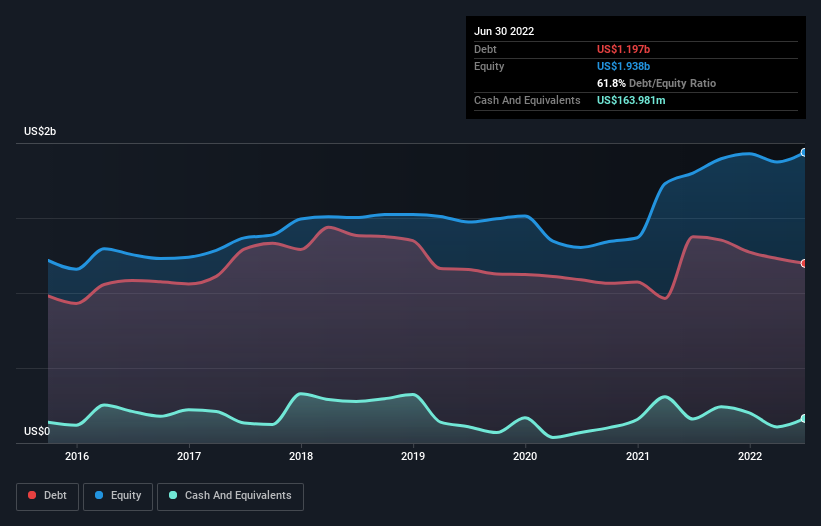- United States
- /
- Marine and Shipping
- /
- NasdaqGS:GOGL
Is Golden Ocean Group (NASDAQ:GOGL) Using Too Much Debt?

Legendary fund manager Li Lu (who Charlie Munger backed) once said, 'The biggest investment risk is not the volatility of prices, but whether you will suffer a permanent loss of capital.' It's only natural to consider a company's balance sheet when you examine how risky it is, since debt is often involved when a business collapses. As with many other companies Golden Ocean Group Limited (NASDAQ:GOGL) makes use of debt. But is this debt a concern to shareholders?
When Is Debt A Problem?
Generally speaking, debt only becomes a real problem when a company can't easily pay it off, either by raising capital or with its own cash flow. In the worst case scenario, a company can go bankrupt if it cannot pay its creditors. However, a more usual (but still expensive) situation is where a company must dilute shareholders at a cheap share price simply to get debt under control. Having said that, the most common situation is where a company manages its debt reasonably well - and to its own advantage. The first thing to do when considering how much debt a business uses is to look at its cash and debt together.
Check out our latest analysis for Golden Ocean Group
What Is Golden Ocean Group's Net Debt?
The image below, which you can click on for greater detail, shows that Golden Ocean Group had debt of US$1.20b at the end of June 2022, a reduction from US$1.37b over a year. However, it does have US$164.0m in cash offsetting this, leading to net debt of about US$1.03b.

How Healthy Is Golden Ocean Group's Balance Sheet?
The latest balance sheet data shows that Golden Ocean Group had liabilities of US$230.2m due within a year, and liabilities of US$1.22b falling due after that. Offsetting these obligations, it had cash of US$164.0m as well as receivables valued at US$81.9m due within 12 months. So its liabilities total US$1.20b more than the combination of its cash and short-term receivables.
This deficit is considerable relative to its market capitalization of US$1.79b, so it does suggest shareholders should keep an eye on Golden Ocean Group's use of debt. This suggests shareholders would be heavily diluted if the company needed to shore up its balance sheet in a hurry.
In order to size up a company's debt relative to its earnings, we calculate its net debt divided by its earnings before interest, tax, depreciation, and amortization (EBITDA) and its earnings before interest and tax (EBIT) divided by its interest expense (its interest cover). This way, we consider both the absolute quantum of the debt, as well as the interest rates paid on it.
Golden Ocean Group's net debt is only 1.3 times its EBITDA. And its EBIT covers its interest expense a whopping 20.8 times over. So you could argue it is no more threatened by its debt than an elephant is by a mouse. Better yet, Golden Ocean Group grew its EBIT by 216% last year, which is an impressive improvement. If maintained that growth will make the debt even more manageable in the years ahead. The balance sheet is clearly the area to focus on when you are analysing debt. But it is future earnings, more than anything, that will determine Golden Ocean Group's ability to maintain a healthy balance sheet going forward. So if you're focused on the future you can check out this free report showing analyst profit forecasts.
But our final consideration is also important, because a company cannot pay debt with paper profits; it needs cold hard cash. So it's worth checking how much of that EBIT is backed by free cash flow. During the last three years, Golden Ocean Group produced sturdy free cash flow equating to 66% of its EBIT, about what we'd expect. This free cash flow puts the company in a good position to pay down debt, when appropriate.
Our View
Happily, Golden Ocean Group's impressive interest cover implies it has the upper hand on its debt. But, on a more sombre note, we are a little concerned by its level of total liabilities. Taking all this data into account, it seems to us that Golden Ocean Group takes a pretty sensible approach to debt. That means they are taking on a bit more risk, in the hope of boosting shareholder returns. There's no doubt that we learn most about debt from the balance sheet. But ultimately, every company can contain risks that exist outside of the balance sheet. For example, we've discovered 3 warning signs for Golden Ocean Group (1 is potentially serious!) that you should be aware of before investing here.
Of course, if you're the type of investor who prefers buying stocks without the burden of debt, then don't hesitate to discover our exclusive list of net cash growth stocks, today.
New: Manage All Your Stock Portfolios in One Place
We've created the ultimate portfolio companion for stock investors, and it's free.
• Connect an unlimited number of Portfolios and see your total in one currency
• Be alerted to new Warning Signs or Risks via email or mobile
• Track the Fair Value of your stocks
Have feedback on this article? Concerned about the content? Get in touch with us directly. Alternatively, email editorial-team (at) simplywallst.com.
This article by Simply Wall St is general in nature. We provide commentary based on historical data and analyst forecasts only using an unbiased methodology and our articles are not intended to be financial advice. It does not constitute a recommendation to buy or sell any stock, and does not take account of your objectives, or your financial situation. We aim to bring you long-term focused analysis driven by fundamental data. Note that our analysis may not factor in the latest price-sensitive company announcements or qualitative material. Simply Wall St has no position in any stocks mentioned.
About NasdaqGS:GOGL
Golden Ocean Group
A shipping company, owns and operates a fleet of dry bulk vessels worldwide.
Solid track record with adequate balance sheet.


